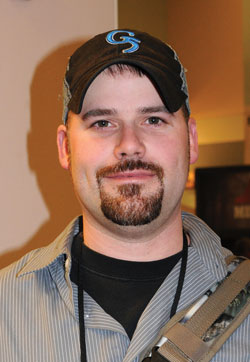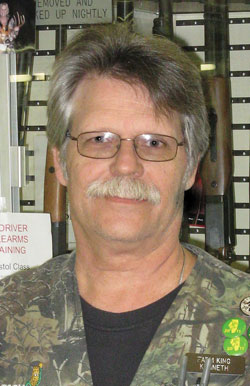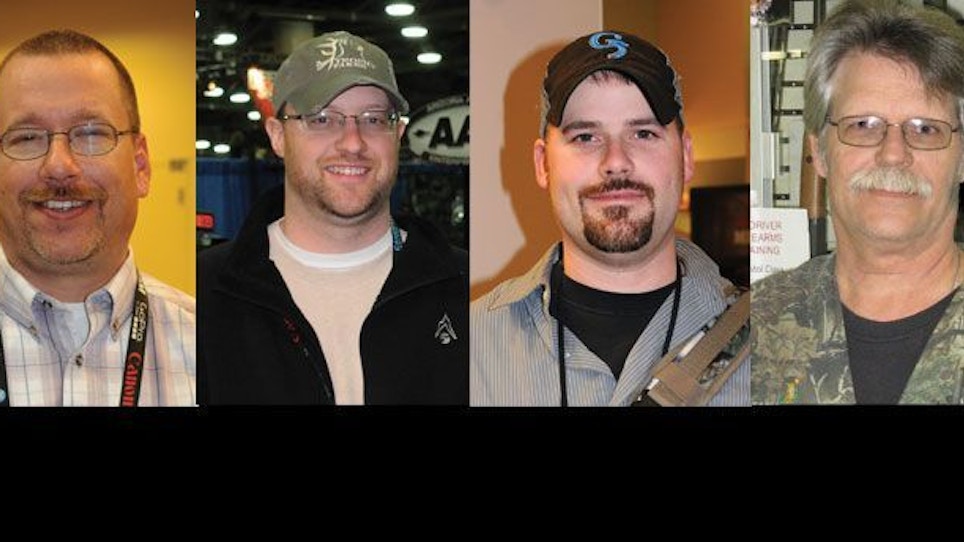Tim Anderson, Tackle Shack, Troy, Ohio
 “I’ve worked here seven days a week for 27 years, so just about everything I do now is a routine,” Anderson said. “Our store opens at 9 a.m., and I’m generally here an hour before that. During our busy season I’m sometimes here two hours early. We close at 9 p.m. through winter, so 14-hour days are nothing uncommon.
“I’ve worked here seven days a week for 27 years, so just about everything I do now is a routine,” Anderson said. “Our store opens at 9 a.m., and I’m generally here an hour before that. During our busy season I’m sometimes here two hours early. We close at 9 p.m. through winter, so 14-hour days are nothing uncommon.
“When I come in, I pick up where I left off the night before. The work varies by the season. In July, I come in, check my email, and look though my arrow orders because we build all the arrows we sell. I look at arrow orders we took the day before and lay out what I need for them. Then I check to see what’s left, and which shafts and components I need to restock.
“I used to try to do most of our ordering just after the store opened, but that doesn’t work as well as it once did. It seems now that guys come in as soon we open. It’s hard to wait on customers and place orders at the same time. I generally wait till the middle of the day to call in my orders. We usually get slower traffic through the door from noon to 4 p.m. I guess most people work those hours, so that’s when I do the jobs I don’t like to put aside once I start.
“When we take in bows, I work 100 percent first-come, first-served. I try to get on it as quickly as I can. I don’t want a backlog. About the only time I’ll move one bow ahead of another is if the first bow needs a part I have to order. I still do most of my ordering by phone. It’s old school, but I like to know the people I’m dealing with. Plus, they tell you right then if the part is available or not. That saves time.”
Ryan Jager, Hunter’s Den, Lapeer, Michigan
 “I’m here every day except Sunday, so when I come back in Monday morning it’s important I make sure the shelves are well-stocked with a good selection before our first customers come in an hour later,” said Jager, sales manager for Hunter’s Den. “Once I know what the shelves look like, I go through the paperwork to see what we have in stock and what must be ordered so our customers don’t have to wait. You can’t let something sell completely out. It has to be here when your customers come looking for it.
“I’m here every day except Sunday, so when I come back in Monday morning it’s important I make sure the shelves are well-stocked with a good selection before our first customers come in an hour later,” said Jager, sales manager for Hunter’s Den. “Once I know what the shelves look like, I go through the paperwork to see what we have in stock and what must be ordered so our customers don’t have to wait. You can’t let something sell completely out. It has to be here when your customers come looking for it.
“My normal checklist each morning is to do the till from the day before, make sure it balances, and verify all the credit card information. I cover all the business from the day before so I’m on top of what we did. After that, I go through all our orders. I make sure I know when a shipment is coming in and what’s in it.
“I deal directly with all the reps, and I always contact them in the morning, usually early. I can’t do it after 5 p.m., because most of them aren’t around then. Most of the time it’s just a quick text with my cell-phone. I know most of them by name and face, and texting saves us both time. Most of their follow-up and order confirmation is done through text, too.
“Unless I have a complicated question, I’d rather not waste a phone call. I don’t like to place orders during our business hours, especially during the peak season when it means time away from our customers. When customers come in, I don’t want my nose in a book.
“The next day I look on the wall, see what we worked on, and which parts and equipment need to be ordered. When UPS comes in later, I go through all those packages, take out products for customers, and cal them to come get it.”
Kenny Williams, Farm King, Galesburg, Illinois
 “I’m the sales tech who handles archery and firearms for Farm King, so we’re just one part of a big store,” Williams said. “To function here, communication must be part of your routine. We’re always moving products from warehouses to our storage area to the sporting goods department, restocking shelves, and working with our buyer to keep inventory up to date. If you don’t have a routine, you’ll never catch up.
“I’m the sales tech who handles archery and firearms for Farm King, so we’re just one part of a big store,” Williams said. “To function here, communication must be part of your routine. We’re always moving products from warehouses to our storage area to the sporting goods department, restocking shelves, and working with our buyer to keep inventory up to date. If you don’t have a routine, you’ll never catch up.
“I work Mondays through Fridays, and every other Saturday. Before leaving for the weekend, I remind our part-time guys that if they take in a bow, make sure they get the customer’s full name, phone number and the problem. When I come back Monday morning, I don’t want any doubt about the bow’s owner and what he wants done.
“Customers come first. They’re trusting you with their bow, but they want it back as soon as possible. I like working on bows early in the morning when I’m alert, wide awake, and customers haven’t started arriving. By late afternoon, you’re more brain-dead. Our routine is especially important the closer we get to October and archery season, when things get panicky.
“The busiest part of our day starts right before noon. As people come in, your priority shifts to them. Sometimes you can fix their bow while they wait. We handle lots of warranty work. If we have to order parts from the manufacturer, we like to be able to hang up the phone and tell customers when to expect their bow back.
“I also make sure everything is stocked and the shelves organized before we open. We’ll restock products all day. We don’t want holes where popular products belong. As things start slowing down after 6 p.m., our part-time people go to our storage area, sort through boxes, and bring the products to me. I have a set place for everything. The better you’re organized, the smarter and faster you work.”
Andrew Gray, Wholesale Sports & Outdoor Outfitters, Federal Way, Washington
 “One of our routines starts at the end of each business day,” Gray said. “We make sure the store is clean and all the equipment properly faced so the store looks organized and professional when we reopen the next morning. The counters are clear and clean, and every slot on our bow racks is full. We basically put the store back together. Everything is in place and accounted for.
“One of our routines starts at the end of each business day,” Gray said. “We make sure the store is clean and all the equipment properly faced so the store looks organized and professional when we reopen the next morning. The counters are clear and clean, and every slot on our bow racks is full. We basically put the store back together. Everything is in place and accounted for.
“The archery department is by the freight area, so when a shipment comes in we don’t take long to bring it in and restock. Our operations people come in at 5 p.m. to move freight, put stock away and make sure everything looks good on display. We want our sales staff concentrating on customers, not stocking shelves. The operations guys pretty much know where everything goes, and our system moves inventory efficiently. When they finish, an operations manager walks the store and inspects it.
“We want a grand-opening appearance every day. We’re staffed and ready to go when the store opens. The customer is our No. 1 priority, and we demonstrate that in every aspect of the business. We staff every part of the store, and our floor people are experts in their areas.
“We hire guys specifically for archery, including a full-time department head running the archery department. We make sure they’re trained up so they know all the camo patterns and which ones work best for wherever a customer hunts. You need different patterns for hunting antelope than you do for going after elk or deer in the mountains.
“We want salesmen, not order-takers. We have a ‘power hour’ between 10 a.m. and 2 p.m., so that no matter what your job, you’re on the floor to help with customers and staff training. I try to get on the floor a couple of hours each day too. We do the best we can to help wherever we’re needed.”






